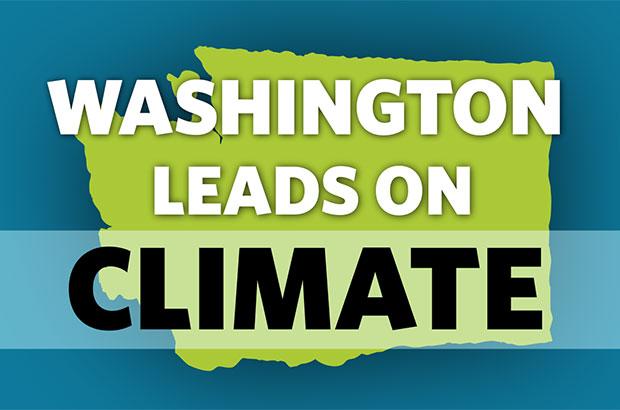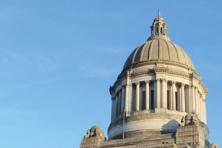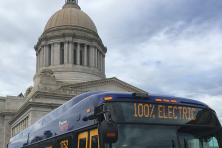Part of me may still be in disbelief, but we did it. 2021 posed a unique opportunity not only to address climate change, but also to tackle long-term systemic racism and the public health crises that are disproportionately impacting BIPOC communities across the nation. Despite the immense challenges posed by the COVID-19 pandemic and working via a digital legislative session, the Washington Legislature doubled down on climate action. Washington State made history in passing a wide variety of policies, big and small, to address global warming pollution, address long-term needs to invest in communities most impacted by pollution, and transition to a clean energy economy.
Read on for a summary of what we accomplished. Then please make sure to thank your legislators for taking bold action!
Now then. What did this year’s Legislature get done, and what’s ahead?
We made history by capping carbon pollution statewide
Of all the priorities we sought to pass this year, we thought that placing a cap on global warming pollution would be the toughest; efforts to establish carbon pricing in Washington go back more than a decade. However, the Legislature passed the Climate Commitment Act. Once that bill is signed into law, Washington will have a firm statewide cap on global warming pollution, covering 75% of all greenhouse gas emissions in the state.
Washington will be only the second state to pass an economy-wide cap on climate pollution, and the very first to commit to cutting those emissions by 95%—one of the most ambitious binding targets in the world.
The Climate Commitment Act (CCA) will incentivize cutting emissions by making it more expensive to pollute. While proactively supporting the transition to cleaner, healthier and safer ways to live in our communities and to get around. The CCA will dedicate $5.2 billion to reducing transportation emissions; most of that will support transit, bike and pedestrian infrastructure, and electrification. At least 35% of overall investments will be targeted to overburdened communities. 10% will be dedicated to projects sponsored by tribal nations, and $250 million will aid in relocating tribal communities threatened by sea level rise. The CCA will also create an air quality monitoring network to safeguard and improve air quality in overburdened communities, directing state and local air agencies to ensure that everyone breathes clean air.
We finally passed a Clean Fuel Standard
Cutting transportation pollution has been a difficult challenge, due to stubborn resistance by the fossil fuel industry and distracting debates fueled by industry misinformation about gas prices. In 2021, Washingtonians’ multi-year effort to pass a Clean Fuel Standard finally succeeded, and the state will now join California, Oregon and British Columbia, extending a clean fuels transportation system across the entire West Coast.
The Clean Fuel Standard will require the oil industry to fund its replacement by investing in cleaner products and clean, low-carbon choices like electricity and sustainable biofuels to power our transportation. In addition to cleaning up pollution from cars and trucks, the program will also expand vehicle electrification and create more jobs in our state’s clean energy economy. Prioritizing clean air will also begin to address long-standing inequities for lower income communities and communities of color who disproportionately live and work near fossil fuel pollution. These communities will also benefit directly from revenue generated by the clean fuels program through targeted investments. The Clean Fuel Standard will achieve a 10% reduction in the carbon intensity of transportation fuels by 2031, and a 20% reduction by 2038.
Two thirds of Washingtonians support cleaner fuels, including voters in every legislative district across the state. The policy was also backed by a broad coalition of support including public health organizations and health care professionals, labor unions, environmental organizations, large and small businesses, tribal and local governments, community groups, utilities, faith communities, and restaurants. Many voices came together to get clean fuels to the Governor’s desk.
We have more work ahead to grow a clean and just transportation system
Legislators have made implementation of both the Clean Fuel Standard and the Climate Commitment Act contingent on the passage of a new transportation package. Climate Solutions will be working hard to ensure that this legislation includes investments supporting bike and pedestrian infrastructure as well as transit. We must also fulfill our state’s obligation to tribal nations by reconstructing culverts for fish passage. Finally, new sources of transportation revenue should be progressive, climate-friendly, and flexible in how they can be spent, so we can invest in a system that is clean, safe, accessible, and just.
We are strengthening a path towards a Healthy Environment for All
Led by environmental justice advocates and partners, the Legislature also passed the Healthy Environment for All (HEAL) Act. The HEAL Act defines environmental justice and requires the definition to be applied in state law to address long-term inequities and harm. The work and the win is truly one of the environmental justice community, who have been advocating for this need for years.
Please take a minute to thank your legislators for these important wins!
The combined effect of these legislative wins will be truly significant. And passing these bills isn't even the full extent of what we all achieved this session.
We are accelerating momentum to make our buildings healthier and safer
Our built environment is a major contributor to global warming; emissions from buildings are growing at a faster rate than any source of carbon pollution in Washington State (see our blog series on clean buildings, discussing the climate, health, and economics case for transitioning from fossil-fueled to all-electric buildings across the state).
This year the Legislature took a number of first steps to help us transition towards 100% clean, all-electric buildings, including launching essential research and regulatory proceedings, eliminating statutes that require the state to expand fossil gas access, and funding $10 million in building electrification grants, but there is more work to do in future sessions to continue to address building emissions.
...and of course we have much work ahead on other climate priorities
Our work is never done for a stable climate and more just world, and there were many other things that the Legislature did not pass this year and still needs to address, notably more advances on clean buildings, prioritizing climate in our land-use planning and accounting for material emissions and fair labor practices in our state’s purchasing.
Yet it’s worth again saying: this session was incredible and historic. A year ago we asked you to join in the call for our legislators to lead on climate in 2021 by passing a Clean Fuel Standard alongside other significant climate action this session. They listened to the people. You helped make this happen.
Right now, please join us in thanking legislators for the important work they did this session.
I’m grateful for the dedication so many have shown, persevering in this important work. Our payoff is moments like this.





